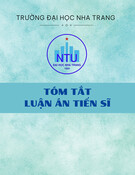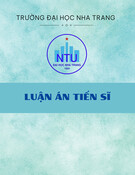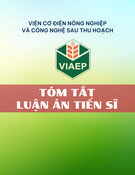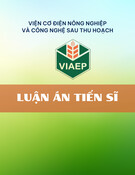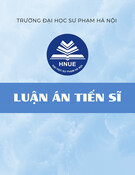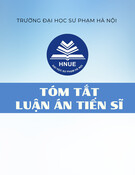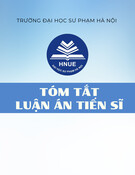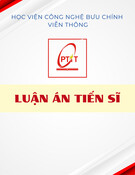
1
INTRODUCTION
1. Rationale
1.1 The aim of higher education are to train highly qualified human resources, improve the people's
intelligence, foster talents; scientific and technological research, new knowledge and products creation,
serving the needs of socio-economic development, ensuring national defense, security and international
integration; at the same time "training learners to develop comprehensively in virtue, mind, body, beauty;
having knowledge, skills and professional responsibilities; capable of grasping scientific and technological
advances commensurate with training level, ability to self-study, creativity, adapt to the working environment;
have spirit to start a business, and ambition of serving people." According to the provisions of the Education
Law (Law No. 43/2019/QH14) to the goal of higher education, "the educational method must be scientific,
promote the positivity, self-awareness, initiative, creative thinking of learners; fostering learners the capacity
to self-study and cooperate, the ability to practice, the passion for learning and the will to rise up." [ 35, p1]
The resolution of the 12th National Party Congress affirmed "Fundamental and comprehensive
renovation of human resource development education and training. The main educational process from
equipping knowledge to developing the capacity and qualities of learners"[12, p114] and "Education and
training have the mission of improving the people's intelligence, developing human resources, fostering
talents, making an important contribution to building the country, building Vietnamese culture and people"
[37, p1]. In order to achieve the goal of developing education and training, the key solution is to "continue to
innovate teaching methods and evaluate learning outcomes, training towards promoting the positivity, self-
awareness, initiative, creativity and self-learning capacity of learners" [37, p12].
1.2. According to Clause 1, Article 8 of circular No. 08/2021/Circular – Ministry of Education and
Training dated March 18, 2021 of the Ministry of Education and Training promulgating the regulation on
university-level training, the requirement on the organization of teaching and university learning must
''promote the active role, while promoting the responsibility of students, create motivation for students to
make efforts to study; maintain school discipline, improve the quality and effectiveness of training [2, p 6];
"The teaching method must be designed in a learner-centered and subject-oriented approach of the training
process, promoting learners to be proactive and make efforts to participate in learning activities"; "The
academic volume of each part of the curriculum is determined by the number of credits, each credit is
calculated as equivalent to 50 hours of the learner's norm including the time of the lecture, guided lessons,
self-study, self-research" [4, p1]. Thus, in the system of regulations on training and teaching at university level,
the Ministry of Education and Training has specific and detailed regulations for university teaching activities
must be designed according to the learner-centered approach and promote learners to promote positivity, take
the initiative and make efforts to participate in learning activities.
Self-study of students is not until the institution of teaching according to the credit institution is set. In
institutional studies, self-study activities are also specified in the Ministry of Education and Training's text,
"for the theoretical or practical, experimental, experimental lessons, in order to acquire a curriculum unit,
students must spend at least 15 hours preparing individuals"[3, p2]. Thus, the regulation on the number of
hours of self-study and self-study of students in the provisions of training according to credit institutions
requires higher requirements, double the number of hours of self-study according to the year. At the same
time, teaching according to credit institutions, the number of class hours of students decreased, while the
number of hours of self-study and self-study of students was prescribed by the Ministry of Education and
Training twice the number of self-study hours of yearly teaching.
1.3. Self-study plays an important role in improving students' cognitive capacity and ability to perceive
new knowledge. Self-study with the efforts of learners and creative thinking, enable learners to learn
knowledge deeply, understand the nature of the problem. In the process of self-study, students will have to
solve new problems and finding answers to problems is the best way to stimulate the development of qualities,
competencies and intellect for students. If the learner lacks their own self-learning efforts, the academic
performance cannot be high despite the positive impact of the lecturer. Self-study gives students the habit of
independent thinking, independently solving difficult problems in the profession, in life, helping them to be
more confident after graduating from university.
In teaching activities, self-learning is essential for lifelong learning of learners, helping learners adapt
to the strong economic and social development. Self-study helps learners not only consolidate and expand






